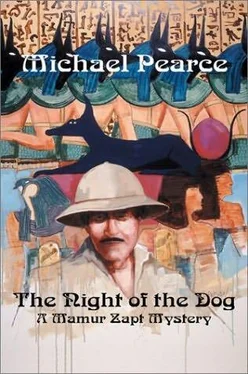Michael Pearce - The Mamur Zapt and the Night of the Dog
Здесь есть возможность читать онлайн «Michael Pearce - The Mamur Zapt and the Night of the Dog» — ознакомительный отрывок электронной книги совершенно бесплатно, а после прочтения отрывка купить полную версию. В некоторых случаях можно слушать аудио, скачать через торрент в формате fb2 и присутствует краткое содержание. Жанр: Исторический детектив, на английском языке. Описание произведения, (предисловие) а так же отзывы посетителей доступны на портале библиотеки ЛибКат.
- Название:The Mamur Zapt and the Night of the Dog
- Автор:
- Жанр:
- Год:неизвестен
- ISBN:нет данных
- Рейтинг книги:3 / 5. Голосов: 1
-
Избранное:Добавить в избранное
- Отзывы:
-
Ваша оценка:
- 60
- 1
- 2
- 3
- 4
- 5
The Mamur Zapt and the Night of the Dog: краткое содержание, описание и аннотация
Предлагаем к чтению аннотацию, описание, краткое содержание или предисловие (зависит от того, что написал сам автор книги «The Mamur Zapt and the Night of the Dog»). Если вы не нашли необходимую информацию о книге — напишите в комментариях, мы постараемся отыскать её.
The Mamur Zapt and the Night of the Dog — читать онлайн ознакомительный отрывок
Ниже представлен текст книги, разбитый по страницам. Система сохранения места последней прочитанной страницы, позволяет с удобством читать онлайн бесплатно книгу «The Mamur Zapt and the Night of the Dog», без необходимости каждый раз заново искать на чём Вы остановились. Поставьте закладку, и сможете в любой момент перейти на страницу, на которой закончили чтение.
Интервал:
Закладка:
Across the street McPhee caught sight of them and began to weave his way in their direction.
“Religion’s at the bottom of it,” said John Postlethwaite. “It usually is.”
“Actually, there are a lot of pagan elements too,” said McPhee, overhearing and mishearing as he came up, and thinking that Postlethwaite was referring to the festival. “The Sham el-Nessim goes back to pharaonic times and even before, and some of its features, notably the phallic ones, have crept into the Moulid and even into the ceremony of the Coptic Easter.”
“A bit of a mixture, eh?” said John Postlethwaite.
“Like Cairo,” said Owen; “like Egypt.”
In the crowd celebrating the Moslem saint he could see Copts as well as Moslems. The humbler Egyptians saw no incongruity between attending the Christian festival in the morning and the Moslem one in the evening; and the Sham el-Nessim was common to all.
A squeal of pipes in the distance announced the imminence of the procession. The policemen remembered their business and began trying to chivvy people back off the streets, or rather, since that was out of the question, attempting to open up a space through which the procession might pass.
Then round the corner came twelve men bearing aloft cressets full of flaming wood. Behind them came three giant camels draped almost to their feet with a sort of scarlet pall encrusted with shells and bits of brass and mirror. The centre camel had a flat saddle on which stood a Bedouin sheikh in grand robes flourishing a battle-axe. The other two camels carried boys with a kettle-drum slung on each side, which they beat incessantly. Right on their heels were a foot band with more kettle-drums and also cymbals which they clashed and bashed without stopping or having any regard to tune.
Then came the first of the carts, drawn by donkeys and crammed full of children all in gay carnival attire. As they passed, they threw brightly-coloured paper streamers into the crowd.
Other carts followed, each representing some guild of workmen or perhaps just a scene which had struck the organizer’s fancy. Around them were masqueraders and tumblers and musicians. The music and the merriment were deafening.
There was a sudden gap in the procession and looks of agitation. The pause became protracted and the crowd fell quiet. And then, struggling round the corner, caught in the lines of lamps and crystal balls which hung across the street, came a huge wooden contraption, a large frame with about fifty lamps on it arranged in four revolving circles, carried by staggering men. Revived by the applause, they struggled on but then were stopped by sudden shouts of alarm. Hanging low over the street in front of them was the shopkeeper’s pride, a line hung with huge gilt crystal chandeliers which swung in the wind and made shifting kaleidoscopic patterns of light and shadow. There was a brief halt while eager youths climbed up the shopfronts and hauled the line high enough for the contraption to pass underneath. With a magnificent flourish on the hautboys, the procession resumed.
It took more than an hour to pass. Halfway through there was a friendly touch on Owen’s shoulder and somebody produced chairs. The Postlethwaites, unused to the heat, sank into them gratefully.
At intervals the seemingly endless train of carts was broken by items of more direct popular entertainment: troupes of acrobats, jugglers competing against each other, masquerades. Some of the turns were satirical, one of them, for instance, representing a stage Englishman with loud golfing trousers, a Union Jack shirt and a tall top hat, who had the crowd in fits with a continuous stream of what were clearly scurrilous remarks.
“Isn’t that a Union Jack?” asked John Postlethwaite.
“I believe it is,” said Owen.
“These chaps make use of any material that comes to hand,” said Paul.
“Looks a bit of a comic turn to me,” said John Postlethwaite.
“Can’t quite make it out,” said Paul vaguely, who certainly could, and was enjoying it.
Included among the entertainers were various groups of Zikr, which Owen found odd in view of the essentially religious nature of their exercises. The thought came into his mind that Jane Postlethwaite might remark on the fact that for an event ostensibly religious in its inspiration there were singularly few items of specifically religious character, and he hastily pointed out to her that many of the little red and white banners that people were carrying had texts from the Koran inscribed upon them.
“Thank you, Captain Owen,” she said politely, and with a certain dryness.
Fortunately, some gorgeous mediaeval palanquins passed at that moment. They were shaped like the cabins of Venetian gondolas and covered with mosaics of silver, ebony and ivory, as rich as the mosaics on an Indian workbox. Each palanquin was slung between two camels, rather peculiarly slung, since the two camels were fastened so close to each other that the head of the rear camel was right under the palanquin, which guaranteed its occupants a boisterous ride.
The front camel was favoured, doubly so, for not only was its head free and erect but it was crowned with a circlet of silver bells and a splendid plume of scarlet feathers.
“The trappings go right back to the Middle Ages, Miss Postlethwaite,” said McPhee learnedly. “But then, some of the features of the Zeffa are very odd. They antedate both the Moslem and the Christian eras.”
The procession was coming to its climax. The music rose to a new crescendo and along the street came a large cart with a raised platform at the front on which was a royal tableau. “The spring king, possibly,” McPhee suggested. The king was a very young king, about fourteen or fifteen years old, though there was no doubt about his being a king since he wore a crown on his head and was richly, if scantily, dressed. Around him were various courtiers, who alternated obeisances to the king with salutes to the crowd.
As the cart approached, they saw that the king was indeed scantily dressed. He was in fact quite naked below the waist. And, attached to his hips by a sort of harness, was a gigantic dildo, grotesquely painted and about two feet long, which waggled and danced in time to the jolting of the cart, to the great delight and applause of all the spectators.
Well, not all.
“I’m a broad-minded chap,” said John Postlethwaite, “but-” He got to his feet. “Come on, Jane. I’ve had enough. It’s time we went.”
With a wry glance at Owen, Jane Postlethwaite followed him.
“Boy, do you pick them!” said Paul as he set off in pursuit.
The Postlethwaites returned to England on the following day. John Postlethwaite asserted his influence and managed to secure two cancelled bookings.
“I’ll be back,” said Jane Postlethwaite.
Fortunately, the end of John Postlethwaite’s visit did not entirely efface the otherwise good impressions he had formed during his time in Egypt, and in future he was able to defend the Administration’s cause with all the authority of first-hand experience.
The Khedive by then was already in Monte Carlo, obligingly furnished with the resources he needed, and content to leave the management of the realm in the capable hands of his new Prime Minister, who happened to be a Copt.
There was a great deal of pleasure at the new appointment — among the Copts, that was-and Owen was greatly surprised to find that the allocation to the Curbash Compensation Fund rose by a third the following financial year. He was even able to anticipate part of the increase and meet some of his expenses in the current financial year by special arrangement with one of the senior officials in the Ministry of Finance, Ramses.
Sesostris and Andrus both disappeared from the Cairo scene, Andrus for an austere regimen in a Coptic monastery in the desert, where he devoted his time to prayer and fasting, Sesostris for an even more spartan regimen in a less religious but more solid building near Alexandria.
Читать дальшеИнтервал:
Закладка:
Похожие книги на «The Mamur Zapt and the Night of the Dog»
Представляем Вашему вниманию похожие книги на «The Mamur Zapt and the Night of the Dog» списком для выбора. Мы отобрали схожую по названию и смыслу литературу в надежде предоставить читателям больше вариантов отыскать новые, интересные, ещё непрочитанные произведения.
Обсуждение, отзывы о книге «The Mamur Zapt and the Night of the Dog» и просто собственные мнения читателей. Оставьте ваши комментарии, напишите, что Вы думаете о произведении, его смысле или главных героях. Укажите что конкретно понравилось, а что нет, и почему Вы так считаете.












